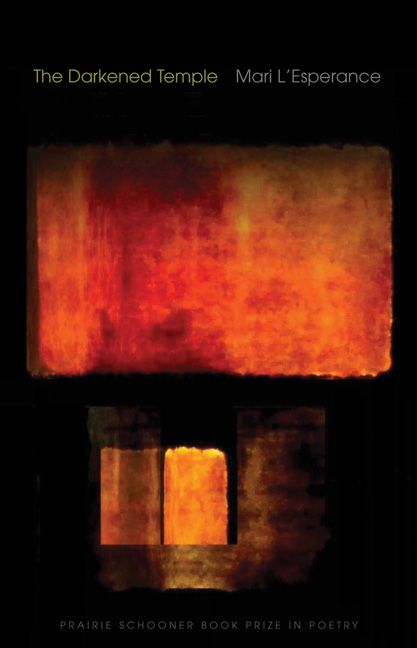Issue 4 - Winter 2011 Reviews Arranging the Blaze Beasts and Violins Crazy Jane Eating Fruit Out of Season Five Kingdoms Hard Rain Heathen Little Oceans Multiverse Open Slowly Psyche's Weathers Silent Music Something Must Happen The Apocalypse Tapestries The Darkened Temple The Kingdom of Possibilities The Tyranny of Milk This Pagan Heaven Woman on a Shaky Bridge You Know Who You Are Interviews
 |
Metaphor is the mortar in Mari L’Esperance’s beautifully laid-out book, The Darkened Temple. The temple is many places, and they are always dark. These places embody countless integrated dichotomies: the visible and the invisible, insecurity and safety, the end and the beginning, arrival and departure, the possible and impossible, belonging and not belonging, the distance and intimacy between a mother and daughter. These are the themes the poet visits in this compelling collection, winner of the Prairie Schooner Book Prize in Poetry. If metaphor is the mortar, search makes up the temple’s building blocks. And the search as content closes around us. Dark metaphorical places drift in and out of L’Esperance’s poems, as she searches for her mother, “who refused to be found, disappearing/the way she did, without a trace—.” The first darkened temple we encounter is among the caves in Japan, where the poet’s mother in her youth had hid with many others during air raids. Now the caves continue to exhale “the unspeakable”:
We find another darkened temple in “Prayer,” in which the poet beseeches an unnamed force in the imperative to dredge the metaphorical deep for memory. And later in “Map of the World” she says, “. . . humans have lost their way / in the deepening darkness. . . .” “Prayer” leads us inexorably into the memory poems of Part Two, in which the poet remembers moments of her life and the dreams she has had of her mother. The darkened temple appears in various iterations, and in “The Last Time I Saw Her,” the mother returns to
And the darkened temple is also the mind: “In the mind there are rooms / we dare not inhabit.” In “The Dark House” the mother cries out: “I am the dark house and the dark house is me.” In “Finding My Mother,” which is one of several dream poems, the mother is seen lying face down in a field.
And it is indeed the very words of these poems that have carried this mother back and brought peace to the poet, “as if quiet were the last safe place.” In spite of the enormous distance between mother and daughter, at times the two women are indistinguishable:
L’Esperance uses language with a basic grace. There is no anger. It is a simple, practical language that perfectly conveys complicated, psychological longings and observations. Her part-Japanese heritage is beautifully integrated into many of these poems with a consummate subtlety. “The self is a house,” L’Esperance writes. The self is the darkened temple. Searching for her mother, the poet is looking for herself. Reviewed by Anne Harding Woodworth. |
